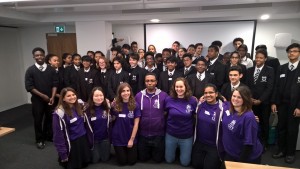Oh, hi. Thanks for stopping by. I’m Sophie, a second year BSc Speech and Language Therapy student at City, University of London. Perhaps rather obviously, I started a City in September 2015, and it has been quite a ride so far. Over the next twelve months, you’ll find out about some of the experiences I’m having as a student, perhaps more specifically as a mature (apparently), disabled student who lives away from home and has several jobs to support herself throughout her studies.
And here are some facts about me that you may or may not find interesting:
- I studied at the University of Exeter from 2004-07, and achieved a 2:1 in my Drama degree.
- I worked as an actress for several years before coming back to retrain at City.
- (The one about being a penguin rehabilitator in my student profile is true, I promise).
- I once ate a whole watermelon in one sitting.
And now some more relevant stuff.
Firstly, a little info on what Speech and Language Therapy (SLT) is, and what you might be able to expect by studying it and being one.
SLTs work all over the place and with lots of different client groups: children with language delay, children and adults with learning disabilities, with swallowing and eating, with clients who’ve sustained brain injuries, with young offenders…the list goes on. Essentially, an SLT is there to help a client/service-user to communicate as effectively as they can, in a way that is appropriate and relevant to them. (N.B. SLTs are not there to get everyone to speak like the Queen. Just to be clear).
I first came across SLT when I was working as a creative facilitator, leading music and drama workshops for groups of disengaged students in a mainstream primary school. I worked leading sessions which focussed on boosting their confidence and therefore willingness and ability to communicate. I then volunteered with the Stroke Association and Sense, to get a bit more of an idea of some of the client groups SLTs work with (stroke survivors/people with dual-sensory impairments, to name just two), and realised that supporting communication and working with small groups, in a job that would be different every day was just what I wanted.
Coming back to study took a while; I’d had eight years out of education prior to starting again at City, so needed to take a Biology A level in order to have evidence of recent study and get onto the course. Teaching myself from course guides, in a year, whilst working full-time was one of the toughest things I’ve ever done (the other being reaching the summit of Mt. Kilimanjaro), but, I made it!
Since starting the course I’ve realised I’d like to work with adolescents, and spend my summers working on a residential programme for 15-17 year-olds, where I’m specifically there to help support and manage challenging behaviour. Some of the young people have specific communication difficulties, some do not. But they all have a sense of humour (please see below for one group’s waffle/chocolate muffin/toffee sauce portrait of me).
I’ve also realised that the course as a whole covers so many different aspects of communication, such as hearing and deafness, social contexts of communication and lots of studying the brain and how we process language. I’ve got a long way to go, and this year is going to be a challenge. The workload gets greater and the marking tougher, but I’m ready to get learning again.
I hope you’ll get an idea of what my experience is like over the coming months, and also see how my photographing and videoing skills improve (or not….).
For now, here’s a little video of the first day of the new term, just a couple of weeks ago….



Recent Comments